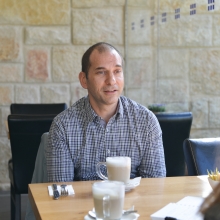The science of extreme weather
New scientists

Extreme weather presents fascinating challenges for a climate scientist. What triggers intense storm systems? How are they formed? What is their contribution to the overall climate? How can their paths and impact be predicted?
Dr. Shira Raveh-Rubin is intrigued by such questions revolving around the science of weather and climate, especially at the extremes.
With thousands of years of human activities surrounding it, the Mediterranean is a crucible for the study of climate change, and it is also highly sensitive to changes in climate. Extreme weather, including heavy precipitation and flash-flooding during the fall season, strong winds and waves during winter, and heat waves and droughts accompanied by forest fires during summer, regularly affect the Mediterranean region causing heavy damages. By combining case studies of highly destructive storms with the analysis of detailed and long-term weather and climate data, Dr. Raveh- Rubin hopes to improve both weather forecasting and global climate models.
Residents of the Mediterranean are so intimately familiar with the strong, seasonal winds of the region that they have given them colorful names over the centuries: the powerful Mistral that howls through Southern France and the Tramontane which blows near the Alps; the hot, dry Sirocco from the Sahara that can reach hurricane speeds in North Africa and southern Europe; and the hot, dusty Hamsin that can blanket Israel and the Middle East.
In her new lab at the Weizmann Institute, Dr. Raveh-Rubin will study these kinds of weather systems and their dynamics. In collaboration with a number of international science teams, her group will work with huge global meteorological datasets that combine models and observations collected over recent history, and develop new diagnostic tools for understanding specific features of weather systems. She will focus on the highly destructive cyclonic storms that often leave a trail of devastation and transport moisture and pollutants across long distances. Her ultimate goal is to better identify the factors and mechanisms that determine the location, intensity, and frequency of climate extremes such as intense droughts, floods, heavy precipitation events, and dangerous storm systems.
“I always loved solving puzzles, uncovering the pieces, and seeing the picture they make,” she says. “I also like the intimate feeling of small discoveries that reveal something special just to me—at first—before making their way out to the community and the public. I am fortunate to study questions that can be seen and felt in our everyday experiences, and perhaps arrive at insights that can help peoples’ lives.”
Dr. Shira Raveh-Rubin completed her BSc in atmospheric sciences with a minor in physics in 2004, and her MSc in atmospheric sciences in 2006, both cum laude at the Hebrew University of Jerusalem. She completed her PhD at the Weizmann Institute of Science in 2012 under the direction of Prof. Brian Berkowitz in the Department of Environmental Sciences and Energy Research (now Earth and Planetary Sciences). She was a postdoctoral fellow at the Institute for Atmospheric and Climate Science, ETH Zurich.
Her academic and professional honors include an excellence award for new students at the Earth Sciences Institute at the Hebrew University in 2001, the Schindel Prize for Excellence in MSc research there in 2005, Rieger-JNF fellowships for environmental studies in 2008 and 2011, a Ministry of Science and Technology excellence fellowship for the advancement of women in science in 2010-2011, and the Otto Schwarz Memorial Graduate Scholarship at the Weizmann Institute in 2012. She received an ETH Zurich postdoctoral fellowship from 2012 to 2014. She gave the keynote address at the 5th European storms workshop (STORMEx) in Bern, Switzerland, in 2015.
She is married and a mother of two, and enjoys nature, traveling and art.
Dr. Raveh-Rubin is supported by The Benoziyo Fund for the Advancement of Science and The Karen Siem Fellowship for Women in Science.








